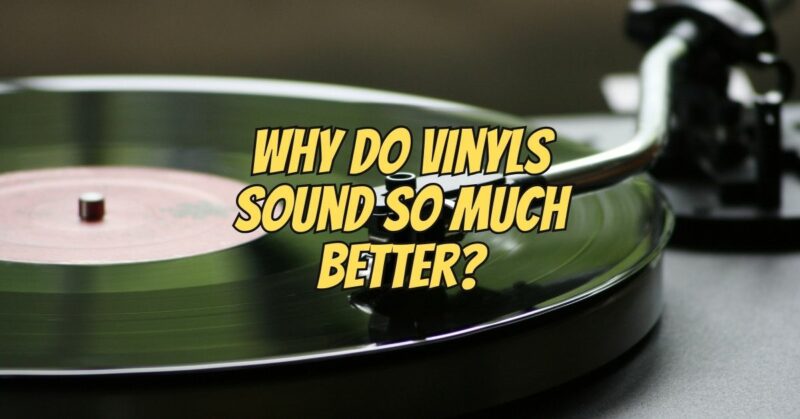Vinyl records are often praised for their unique sound characteristics, which some listeners find more appealing or “better” than digital audio formats like CDs or streaming. However, it’s important to clarify that the perception of vinyl sounding “better” is subjective and varies from person to person. What many people describe as the “better” sound of vinyl is based on specific sonic qualities associated with the analog format. Here are some factors that contribute to vinyl’s distinct sound:
- Analog Nature: Vinyl records are analog, meaning that the audio signal is represented continuously, without the discrete sampling and quantization used in digital audio. This analog nature is often cited as the source of vinyl’s warmth and organic character.
- Vinyl Compression: Vinyl records employ a form of natural compression. As the groove spirals inward, the physical space available for the audio signal decreases. This results in a gradual reduction in volume for louder passages, which some listeners find musically pleasing.
- Vinyl Distortion: Vinyl can introduce a form of harmonic distortion, including even-order harmonics. These harmonics can contribute to a sense of warmth and richness in the sound.
- Tactile Experience: Handling vinyl records and interacting with the turntable, tonearm, and stylus can enhance the overall listening experience. The tactile nature of vinyl can contribute to a deeper sense of engagement with the music.
- Dynamic Range: Vinyl records can have a wide dynamic range, allowing for greater expression and impact in music. Some listeners appreciate vinyl’s ability to reproduce the full spectrum of volume levels in a recording.
- Soundstage and Imaging: Vinyl records are known for creating a wide and immersive soundstage with precise instrument placement (imaging). This can enhance the sense of space and realism in the music.
- Collector’s Appeal: For some, the collectibility and ritual of playing vinyl records contribute to the perception of vinyl sounding better. Limited editions, colored vinyl, and unique pressings can be attractive to collectors.
- Nostalgia: Nostalgia can play a significant role in the preference for vinyl. Many people associate vinyl records with their musical upbringing or specific memories, which can influence their perception of the format.
It’s important to recognize that vinyl records also have limitations, including susceptibility to surface noise, pops, and clicks, as well as the need for proper care and maintenance. Additionally, preferences for audio quality are highly subjective, and what sounds “better” to one person may not be the same for another. Some listeners prefer the clarity and precision of digital formats, while others are drawn to vinyl’s analog characteristics.
Ultimately, the preference for vinyl or any other audio format comes down to individual taste and priorities in the pursuit of the best possible listening experience.

